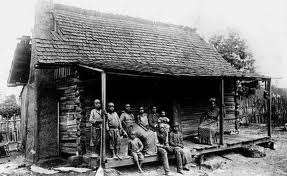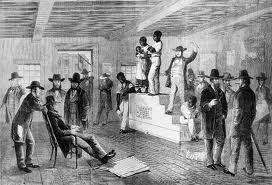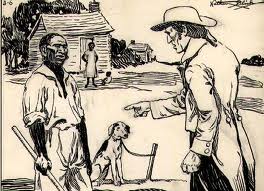 Alabama Slavery Debate or Interpreting Biblical Law, was the dinner subject between a Union Officer and a prosperous slave owner near Athens, Alabama during the Civil War. Alfred Burnett, a Union soldier and an embedded reporter, is said to have filed the following story with the newspapers of Cincinnati, detailing the Alabama Debate.
Alabama Slavery Debate or Interpreting Biblical Law, was the dinner subject between a Union Officer and a prosperous slave owner near Athens, Alabama during the Civil War. Alfred Burnett, a Union soldier and an embedded reporter, is said to have filed the following story with the newspapers of Cincinnati, detailing the Alabama Debate.
“At Athens, Alabama, in the summer of 1862, General G—— was invited to make his head-quarters at Dr. Nicklin’s, one of the largest slaveholders in that part of the State, a devoted member of the Methodist Episcopal Church, and really a highly cultivated and courteous gentleman. One day he charged the General with being radical. The General said, “No, I’m only a Republican; but I have a most radical commissary on my staff.” The next day the radical commissary was invited to the house by Mrs. Nicklin, who said she “wanted to see a Yankee who would not deny being an Abolitionist.” While at dinner the Doctor proposed to investigate the causes of our wide differences. Captain H—— remarked at the same time:
“Would it not be better, while enjoying your hospitalities, to talk upon subjects of agreement?”
“No,” said the Doctor; “we arrive at truth only by comparing notes.”
“Then,” the Captain said, “I must be a freeman, and talk from my own platform.”
“Certainly,” was the answer.
“Then,” said the Captain, “you are on trial. You must give a reason for the hope within you. We charge you with having commenced a wicked and causeless war. And now give us your reasons for it.”
“Well, in the first place, the Abolitionists are fighting against the Bible, and against God. The Bible, an express revelation from Heaven, says, ‘When these servants, or slaves, are to be procured of the heathen round about you, of them shall ye buy, and they shall be your possession forever.’ That settles the question of moral right; and in relation to the political question, you were for excluding us from the territories, when they were manifestly ours equal with yours. We had the same right there with our property that you had. Equality of rights was the cardinal principle of our Government. In your political action you strike a blow at the very foundation of our Government—equality of rights.”
 To which Captain H—— replied: “Though not much of a theologian, I have, nevertheless, looked into the Levitical law, and found a paragraph like the following: ‘He that stealeth a man, or selleth him, or if he be found in his hands, shall surely be put to death.’ Let us analyze this ‘stealeth a man’—the foreign slave-trader—’and selleth him’—the American slave-seller, or, ‘if he be found in his hands’—the American slaveholder. If you will show me how any of these can escape punishment, then I will pursue the Biblical argument. In regard to the political question, the citizen of Ohio and the citizen of Alabama are treated just alike. A citizen of Ohio can take his household goods, merchandise, and cattle into the territories. A citizen from Alabama has the same right, but he can not take his slave; nor yet can a citizen of Ohio. Hence, they have equal rights.
To which Captain H—— replied: “Though not much of a theologian, I have, nevertheless, looked into the Levitical law, and found a paragraph like the following: ‘He that stealeth a man, or selleth him, or if he be found in his hands, shall surely be put to death.’ Let us analyze this ‘stealeth a man’—the foreign slave-trader—’and selleth him’—the American slave-seller, or, ‘if he be found in his hands’—the American slaveholder. If you will show me how any of these can escape punishment, then I will pursue the Biblical argument. In regard to the political question, the citizen of Ohio and the citizen of Alabama are treated just alike. A citizen of Ohio can take his household goods, merchandise, and cattle into the territories. A citizen from Alabama has the same right, but he can not take his slave; nor yet can a citizen of Ohio. Hence, they have equal rights.
At the close of the discussion the Doctor said, that “his neighbors were greatly alarmed when the Union army came into the district, for fear the slaves would leave them; but I said to my slaves, ‘If you prefer to go away and leave me, do so: come and tell me; don’t sneak away at night with your little bundle, but come right up and tell me, “We want to leave,” and I will give you five dollars, and let you go, with this condition, that you never show your faces around my plantation.'”
Captain H—— looked as though it were doubtful, but said nothing. About a week afterward, the Doctor said to the General—
“I want you to take a ride with me over to the plantation. You Northern men don’t know how well our slaves love us. Whenever I go to see them, they run out to meet me; inquire after my wife and children with as much interest as your children would inquire after you.”
The General said he “would be glad to avail himself of the opportunity to see the workings of their system,” and started off with the Doctor.
On the way down, the Doctor remarked that he “had another reason for wishing him to go down;” that “there were three cases of insubordination, and I want to show you my mode of controlling slaves. When I told your Abolition commissary, Captain H——, the other day, how I managed my boys, I saw he did not believe one word I said. Now I want you to see for yourself; then you can convince him.”
 Arriving at the plantation, sure enough, the slaves came out, and made special inquiries about his wife and family. The General said that the saddest sight of all was, that all these women and children gave promise to increase the number of slaves—girls eleven years old were among these.
Arriving at the plantation, sure enough, the slaves came out, and made special inquiries about his wife and family. The General said that the saddest sight of all was, that all these women and children gave promise to increase the number of slaves—girls eleven years old were among these.
The Doctor called up the culprits and addressed the principal offender. “Aleck,” said he, “unless you submit to the mild punishment of our plantation discipline, all order and discipline will be lost. You know my rule. I have told you before, whenever you are not satisfied, just say so, and I will let you go. What do you say, Aleck, Bob, and Dick?”
Bowing very low, the darkeys said, “Well, den, massa, gib us de fibe dollars and we go.”
He turned pale, and, being utterly dumfounded, after regaining himself, and not giving them the money, said, “Be off, then!” He had too much of the Southern chivalry to back out, and came away a wiser if not a better man, but said “nary word” about convincing the Abolition commissary.”
The Alabama Slavery Debate or Interpreting Biblical Law, is a prime example of God’s truth setting all men free.
Bummer


This guy sounds like the ancestor of those neo-Confederates who argue slavery was good for the slaves. I suppose you can convince yourself a lot of things are beneficial when it helps your business interests.
Louis,
The “old guy” thinks the irony of the debate is classic. In addition, the “massa” is so convinced of the loyalty of his slaves, that he is willing to show off their gratitude. How humiliating. Serves him right!
Thanks for following the Alf Burnett thread.
Bummer